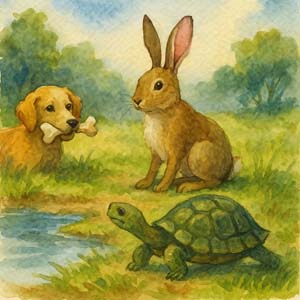 Famous storyteller Aesop (c. 620–560 B.C.) was a Greek slave who earned his freedom and became known for timeless wisdom and moral clarity.
Famous storyteller Aesop (c. 620–560 B.C.) was a Greek slave who earned his freedom and became known for timeless wisdom and moral clarity.
Aesop’s parables featured animals who spoke like humans but taught truths for people. His fables—concise, surprising, and insightful—offered life lessons we still quote today.
In The Dog and the Shadow, a greedy dog drops his bone trying to grab its reflection. “If you covet all,” Aesop warned, “you may lose all.”
In the classic Hare and the Tortoise, a boastful hare naps mid-race, only to lose to the steady tortoise. “Slow but steady wins the race,” Aesop advised.
Historians have debated Aesop’s authorship and even his existence. His stories were later refined by Jean de La Fontaine, and translated into English by George Fyler Townsend and Ambrose Bierce.
“Beauty is in the eye of the beholder,” Aesop mused in Jupiter and the Monkey. “United we stand, divided we fall,” he reminded in Man and His Sons.
 It is easy to be brave from a safe distance. ✨
It is easy to be brave from a safe distance. ✨
